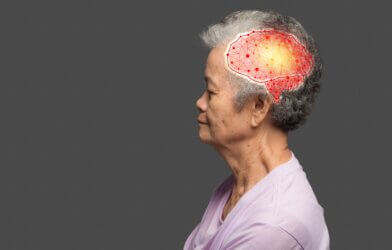The amount of estrogen you have in your body could determine your risk for dementia later on in life, suggests a new study. Researchers from the George Institute for Global Health found that some reproductive events such as early menstruation and a hysterectomy were associated with a higher risk of dementia. Interestingly, people who have been pregnant, had an abortion, or had late menopause were linked to a lower risk of dementia.
Almost 50 million people worldwide have dementia and the rate is expected to triple by 2050. Prior research has found the likelihood of developing and dying from dementia is higher in women than in men.
“While the risk of developing dementia increases with age, we don’t yet know whether the higher rates seen in women are simply because they live longer,” explains Jessica Gong, a PhD candidate at the George Institute for Global Health and lead author of the study in a press release. “But it’s possible that female-specific reproductive factors may be able to explain some of the sex differences.”
The research team analyzed data from 273,240 women without dementia who were registered with the UK BioBank database. They found that women were at a higher risk of developing dementia later in life if they experienced the following:
- Early menstruation
- Late menstruation
- Being of young age when delivering first child
- Hysterectomy without surgical removal of one or both ovaries
- Hysterectomy after ovary removal
While taking birth control pills was associated with a lower risk of dementia, the current study could not support a link between contraceptives and dementia risk. Meanwhile, if a woman had ever been pregnant, had an abortion, had a longer reproductive lifespan, or had late menopause, their risk was lower.
“We found that the higher dementia risk linked to early (natural and artificial) menopause was more pronounced in women of lower socioeconomic status,” Ms. Gong says.
While understanding the factors that increase dementia is important, the next phase requires research on treatments to reduce a person’s risk of developing the disease.
“More research is needed to understand whether these differences are associated with life-long exposure to the body’s own estrogen, and whether external hormone use could influence the risk of developing dementia,” explains Ms Gong. “Our findings may be helpful for identifying high-risk women to participate in future clinical trials to assess potential preventive measures and treatments.”
The study is published in the journal PLoS Medicine.













I think the finding that abortions lower dementia is skewed!
I volunteered as a mentor at a pregnancy center for 9 yrs and found women who had abortions were so depressed and mentally distraught over their decision to eliminate life! Some were so sad!